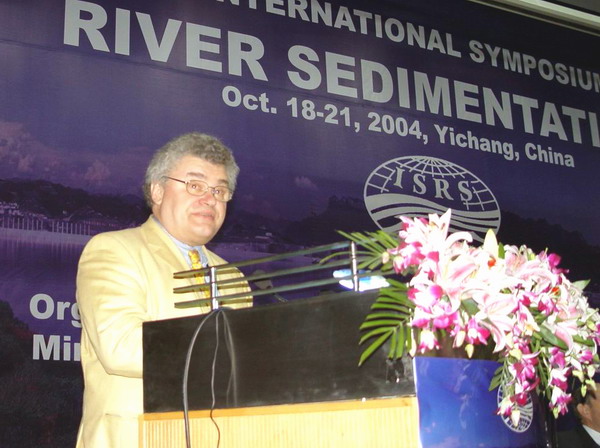
联合国教科文组织(UNESCO)代表Nagy出席会议并讲话

国际泥沙信息网10月19日讯
世界泥沙研究学会于今日正式成立,联合国教科文组织(UNESCO)代表Nagy出席会议并讲话。全文如下:
Ladies and Gentlemen,
Dear Colleagues,
First of all let me congratulate all of you for creating WASER. It is a great honor and pleasure to be amongst you at this important inaugural ceremony. Let me also congratulate my friend, Professor Des Walling for being elected the founding President of WASER and also members of the Council just elected and wish them well in their endeavor.
Yesterday I have outlined IHP’s involvement in erosion and sedimentation, particularly the new International Sedimentation Initiative, so with your permission I will not dwell upon that once more apart from stating our strong commitment in cooperating closely with WASER particularly within the framework of ISI.
Dear Colleagues,
To create a new professional NGO is always a very exciting moment, full with expectations and plans. It should be like this, however, we should all realize that it would not be an easy march to victory. A lot of work is ahead of us that will certainly have its ups and downs. All the more important it is to start building alliances from day one with those professional NGOs and intergovernmental organizations that will need the services of WASER and that in turn could also contribute in building it up as a strong and meaningful association. Indeed, we have a huge task ahead.
I am sure that many of you know that one day Albert Einstein has allegedly ask his son Hans Albert: “ What are you working on, son?” “ I am working on my Thesis on sediment transport,” replied Hans Albert. “ Oh, be careful, that is too complicated. It’s beyond me,” said father Einstein. I am not sure whether this is a true story but it certainly is still valid as far as the complexity of the issue goes. Yesterday we have heard in the brilliant talk of Professor Sam Wang that owing to the tremendous progress in computational technology over the past ten years we basically have no more computational barrier in investigating sediment-water interactions. He has also shown some beautiful examples. This is the good news. The bad news is that we still have major problems in measuring sediment yield rendering therefore the comparison of data almost impossible at a global scale. I believe there is a lot of room here to improve our measurement methods by utilizing new technologies, such as laser technology for example. This is one area, for instance, where WASER could provide an immense contribution that may lead to a global standardization of sediment measurement technologies.
Given the global importance of sedimentation, and its causes such as erosion and land use, IHP is strongly committed to support WASER. There are many on-going IHP activities where WASER could already join in as a partner. Beyond ISI let me refer here to the International Flood Initiative (IFI), the FRIEND (Flow Regimes from International, Experimental and Network Data) programme and many other components of IHP. We are very pleased to note that the Secretariat of WASER will be provided by IRTCES, a Center closely linked to UNESCO. It is also refreshing to see that finally we have a Secretariat that does not fall into the London-Stockholm-Rome Bermuda Triangle of professional NGO secretariats. I also view it as recognition of the Chinese erosion and sedimentation science community that is very well deserved indeed. In these fields China is definitely in a donor position as it has so much knowledge and wisdom to share with the others. Capacity building in these areas in the developing countries is of great importance, particularly in Africa that can loose half of its storage space within a few decades due to reservoir sedimentation. I do hope that in turn WASER will help IRTCES in building up a geo-referenced data base on erosion and sedimentation with the ISI framework.
As the problems we are facing in sedimentation are multi-disciplinary their solution requires a truly interdisciplinary approach. I believe from early on WASER should strive for this interdisciplinarity by building strong alliances with the soil science, plant physiology and desertification communities as well as with other NGO partners, such as IAHS, IAHR, IWA, IHA, ICOLD and others. I hope that in due course WASER will be strongly linked to UNESCO and will take part in designing and implementing various phases of IHP. We are looking forward to that happen as soon as possible.
We certainly hope that WASER will be problem driven and will not get bogged down in compartmentalized disciplinary commissions but will maintain its interdisciplinarity, including social considerations as well.
In closing, let me repeat that the unity of purpose will link IHP and
WASER closely together and that we are committed to build that close
link together.